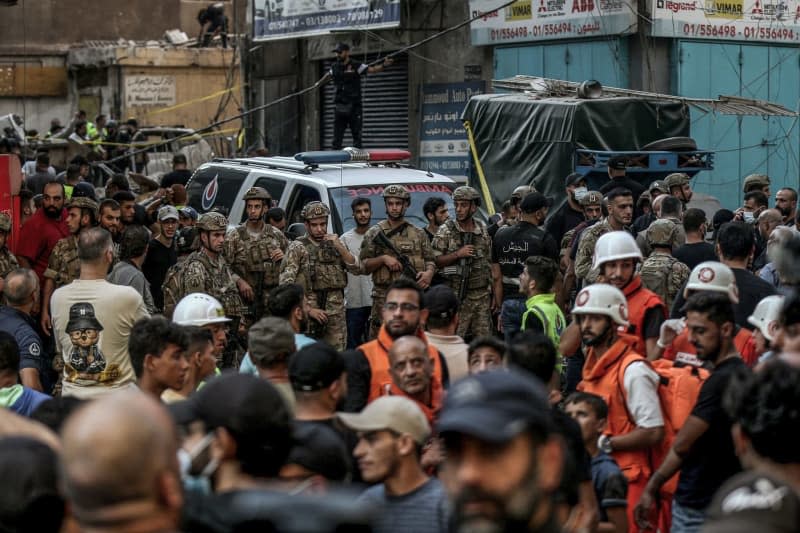Israel said on Tuesday it was intensifying its bombing campaign in Lebanon as two days of airstrikes targeting the Shiite Hezbollah militia sent the death toll above 550 and forced tens of thousands of people from their homes.
The dead included Hezbollah’s rocket chief and two UN aid agency employees.
“We must not let Hezbollah rest. We must continue with all our strength,” the Israeli chief of staff, General Herzi Halevi, said, according to military sources.
The attacks are to be intensified and more military forces will be deployed, he said. The Israeli Air Force said it had struck “Hezbollah terror targets in southern Lebanon, including launchers, terrorist infrastructure sites and buildings in which weapons were stored.”
Hezbollah rocket chief killed
The Israeli Defense Forces (IDF) later announced it had killed Hezbollah’s rocket chief in the Beirut suburb of Ghobeiry.
They said Ibrahim Qabisi was responsible for rocket attacks on Israel and for attacks on civilians. In addition to Qabisi, other commanders in the rocket unit were also killed, a statement added.
The IDF said that Qabisi “planned the abduction terror attack in Mount Dov in the 2000s” in which three Israeli soldiers were “abducted and killed.” The bodies of Omar Suwad, Benny Avraham and Adi Avitan were returned to Israel in 2004 in a prisoner swap between Israel and Hezbollah mediated by Germany.
The Lebanese Health Ministry said six people were killed and 15 injured in the strike. Witnesses reported that two floors of a building had been destroyed and videos showed large clouds of smoke.
Also on Tuesday, four residents and a Syrian refugee were killed in Israeli attacks on the Lebanese village of Duair south of Beirut, while six people are dead in air strikes in Nabatijeh, the Lebanese state news agency NNA reported.
Tens of thousands on the run
Tens of thousands of people in Lebanon have been displaced by Israeli airstrikes, according to official figures released on Tuesday.
Of those displaced, 27,000 have sought refuge in emergency shelters in the south and the Bekaa Valley in the east, said Nasser Jassin, the acting environment minister.
More than 250 schools have been quickly converted into emergency shelters for this purpose. Since then, basic relief supplies, hygiene items and meals have been distributed to around 20,000 people. Mattresses are in particularly short supply in the shelters.
The aid organization Doctors Without Borders (MSF) reported that teams were distributing mattresses and hygiene articles in emergency shelters throughout the country. There are also telephone counselling centres for displaced persons to provide them with psychological support.
Many MSF staff remained in their homes in the south and east due to the ongoing Israeli attacks, while others fled.
Militia hits back
Hezbollah, which is based in Lebanon but is backed by Iran, said it launched numerous attacks, including on a military base in northern Israel near the city of Safed. The Israeli military also said it had recorded around 300 shells fired from Lebanon into Israeli territory over the past two days.
The militia said it sent a volley of rockets at Israeli military bases, including the heavier Fadi-1 and Fadi-2 rockets.
The Iran-backed group said it targeted bases near the Israeli city of Haifa, a military airfield west of Afula and other locations including the town of Rosh Pina.
Israel’s army said Hezbollah has launched more than 8,800 rockets and drones in just under a year. Until the recent escalation, Hezbollah had mainly used smaller rockets and drones against Israel.
Deadly days in Lebanon
The number of people killed in two days of Israeli airstrikes in Lebanon has meanwhile risen to 558, with some 1,835 injured, Lebanese Health Minister Firas Abiad said.
Some 50 children were among the dead, he said. The injured were being treated at over 54 hospitals and medical centres across Beirut and southern Lebanon, added Abiad, who is health minister in a caretaker government.
The United Nations refugee agency (UNHCR) said two of its employees had been killed in Israeli strikes in Lebanon, adding it was “outraged and deeply saddened” by the deaths.
Dina Darwiche, from their Bekaa office in eastern Lebanon, died after the building she was residing in was hit by an Israeli missile on Monday, UNHCR said in a statement.
“Her husband and one of her children were rescued and are being treated in hospital for serious injuries. Dina and her youngest son’s bodies were tragically recovered today,” the statement said.
It added that Ali Basma, who also has worked in UNHCR’s Tyre office in southern Lebanon was confirmed dead on Monday.
As the war in Gaza approaches its first anniversary, the Israeli attacks mark a dramatic escalation of the conflict with Hezbollah to the north.
In another major blow to Hezbollah last week, many hundreds of pagers and walkie-talkies used by its members exploded across Lebanon. Many observers attributed the attack to Israel, although Israel has not officially claimed responsibility.









